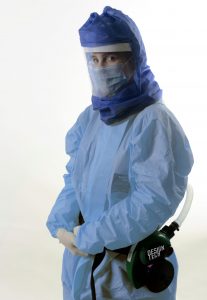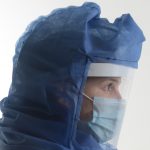“Air-Shield” Improves Doctors’ Protective Masks
“Air-Shield” Improves the Effectiveness of Doctors’ Protective Masks
The Design-Tech Lab at Technion and Rambam Health Care Campus have developed an innovative device for medical staff’s masks, that continuously blows air on their faces, improving protection against infection while eliminating fogging and overheating.
 Prof. Ezri Tarazi, Chair of the Industrial Design Program and head of the Design-Tech Lab at Technion, together with doctors at the Clinical Research Institute at Rambam Health Care Campus, have developed a breakthrough device that dramatically improves the efficacy of protective masks worn by COVID-19 medical staff everywhere. Body temperature often causes condensation to build up inside the protective gear, which makes the masks fog up, so that it is difficult for medical staff to see properly when treating patients. There is additional concern that current protective masks are not sufficiently effective at eliminating infection by the virus aerosol droplets.
Prof. Ezri Tarazi, Chair of the Industrial Design Program and head of the Design-Tech Lab at Technion, together with doctors at the Clinical Research Institute at Rambam Health Care Campus, have developed a breakthrough device that dramatically improves the efficacy of protective masks worn by COVID-19 medical staff everywhere. Body temperature often causes condensation to build up inside the protective gear, which makes the masks fog up, so that it is difficult for medical staff to see properly when treating patients. There is additional concern that current protective masks are not sufficiently effective at eliminating infection by the virus aerosol droplets.
“As medical teams continue to care for Coronavirus patients when one medical worker becomes infected, everyone on the team must be isolated. Therefore, protecting the entire team is a high priority,” says Tarazi.
Dr. Ronen Zalts, the first to test the device in Rambam’s COVID-19 department, and Prof. Tarazi explained that “the new invention generates airflow downwards from the forehead area and creates an ‘air shield’ inside the protective mask that isolates the doctor from the surrounding atmosphere, which may carry COVID-19 droplets. A small pump attached to the waist blows air through a tube up to the forehead, which is expelled via small holes in a manifold attached to the mask.”
“We tested several different prototypes and made some improvements in order to refine the design and to optimize its effectiveness,” said Dr. Asaf Miller, head of the Internal Medicine ICU and a member of the COVID-19 management team at Rambam.
Prof. David Greenblatt of Technion’s Faculty of Mechanical Engineering carried out tests to ensure that the airflow is uniform.
Although the N95 masks used by medical staff provide 95% protection, the team sought to further improve the protection level. The new technology is the product of an outstanding collaboration between Technion and the Rambam Health Care Center in Haifa. The Technion team developed the mask, while Rambam staff carried out the clinical trials in a highly accelerated timeframe of collaboration.
 Medical staff worldwide report that problems of overheating and foggy glasses are among the additional challenges that make it difficult for the medical staff to care for COVID-19 patients. Prof. Tarazi based the idea on pumps used in the IDF protective masks against nuclear, biological and chemical (NBC) warfare, and adapted them to the needs of the medical professionals. “We integrated a thin flexible tube, a lightweight manifold, a thin shield and a rechargeable battery. All the components already existed, except for the manifold, which is being specially manufactured at Technion using Hewlett Packard industrial 3D printers.”
Medical staff worldwide report that problems of overheating and foggy glasses are among the additional challenges that make it difficult for the medical staff to care for COVID-19 patients. Prof. Tarazi based the idea on pumps used in the IDF protective masks against nuclear, biological and chemical (NBC) warfare, and adapted them to the needs of the medical professionals. “We integrated a thin flexible tube, a lightweight manifold, a thin shield and a rechargeable battery. All the components already existed, except for the manifold, which is being specially manufactured at Technion using Hewlett Packard industrial 3D printers.”
Dr. Zalts added, “I wore the shield while working in the COVID-19 department on Friday and it was amazing. It cooled me off and prevented condensation from accumulating, making it significantly easier to treat patients, and gave me an added sense of security since it continuously expelled air providing extra protection against droplet infection.”
Technion has produced an initial quantity of air shields for the Rambam Health Care Campus which are already in use.


